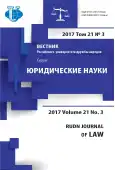CONSTITUTIONAL PROBLEMS OF IMPLEMENTATION OF CULTURAL POLICY IN THE REPUBLIC OF CRIMEA AND SEVASTOPOL
- Authors: Zametina T.V1
-
Affiliations:
- Saratov State Academy of Law
- Issue: Vol 21, No 3 (2017)
- Pages: 415-435
- Section: Articles
- URL: https://journal-vniispk.ru/2313-2337/article/view/343914
- DOI: https://doi.org/10.22363/2313-2337-2017-21-3-415-435
- ID: 343914
Cite item
Full Text
Abstract
The article considers the problem of implementing cultural policy in the new constituent entities of the Russian Federation - Republic of Crimea and Sevastopol. Russia historically formed as a state, uniting on its territory of the representatives of different peoples, cultures and faiths, held in some mod-ern countries, the policy of multiculturalism, actualizes the issue of combating xenophobia, national and religious intolerance in society, the preservation and development of cultural identity of different peo-ples. The construction of culture in the rank of national priority aims to give new impetus to the devel-opment of the cultural foundations of Russian constitutional system, to guarantee the unity of the cul-tural and legal space, the state and territorial integrity. Having considered the constitutional-legal bases of the state cultural policy at the Federal level and at the level of the new subjects of the Federation, the author reveals the problems of legal regula-tion, defines the main directions of improvement of legislation in this area. The author comes to the conclusion that some modernization need of the constituent acts of the Repub-lic of Crimea and Sevastopol in respect of fixation in a separate article of the right of peoples living on the ter-ritory of the Republic to preserve their national identity through the development of national-cultural autono-mies, national-cultural centers and associations, as well as provisions on the promotion of the regional author-ities the activities of those public associations that are inconsistent with Russian law. Further development require conceptual foundations of national policy in the new subjects of the Federation aimed at creating conditions for satisfaction of ethnopolitical, ethnosocial and ethnocultural needs residing in the Republic Nations and ethnic communities. Continuing controversies in the field of linguistic relations, is due, in particular, the failure of the Federation to recognize the right of the subjects to change the graphic basis of the alphabet may be im-paired by constitutional, legal, and financial guarantees regime of equality of status to all the languages of peoples and ethnic groups living on the territory of the Russian Federation. At the end of the article formulates proposals aimed at improving the existing Federal legislation and normative legal acts of the Republic of Crimea, Sevastopol and the Russian Federation in the field of cultural policy.
About the authors
Tamara V Zametina
Saratov State Academy of Law
Author for correspondence.
Email: zametina_saratov@mail.ru
Zametina Tamara V. - Doctor of Legal Science, Professor, Department of Constitutional and International Law, Saratov State Academy of Law.
1, Volskaya st., Saratov 410056, RussiaReferences
- Kabyshev, V. T., Zametina T. V. (2016) Rossiya-Krym- Sevastopol': konstitutsionno-pravovoe issledovanie [Russia-Crimea-Sevastopol: the Constitutional Legal Research]. Moscow, Izdatel'skii dom “Gorodets”. (in Russian)
- Khabrieva, T. Y. (2008) Teoriya sovremennogo osnovnogo zakona i rossiiskaya Konstitut-siya [The Theory of Modern Basic Law and the Russian Constitution]. Zhurnal rossiiskogo prava [Journal of Russian Law]. (12), 15–23. (in Russian)
- Kochesokov, Z. Kh. (2008) Problema mul'tikul'turalizma v globaliziruyushchemsya mire [The Problem of Multiculturalism in a Globalizing world. Obshchestvo i pravo [Society and law]. (3), 282–286. (in Russian)
- Kryazhkov, V. A. (2014) Krymskii pretsedent: konstitutsionno-pravovoe osmyslenie [The Crimean Precedent: Its Constitutional and Legal Comprehension]. Sravnitel'noe konstitutsionnoe obozrenie [Comparative Сonstitutional Review]. (5(102)), 82–96. (in Russian)
- Petukhova, T. N. (2013) Mezhetnicheskaya tolerantnost' v Rossii: teoretiko-pravovoe issle-dovanie [Interethnic Tolerance in Russia: Theoretical and Legal Research]. Abstract of Disserta-tion of Сandidate of Legal Science. Chelyabinsk. Russian Academy of Public Administration un-der the President of the Russian Federation. (in Russian)
- Polenina, C. V. (2005) Mul'tikul'turalizm i prava cheloveka v usloviyakh globalizatsii [Mul-ticulturalism and Human Rights in the Condition of Globalization]. Gosudarstvo i pravo [State and Law]. (5), 66–77. (in Russian)
- Polenina, S. V. (2016) Vzaimosvyaz' pravovoi politiki i kul'tury i ee otrazhenie v zakono-datel'stve [The Interrelation of Legal Policy and Culture its Reflection in Legislation]. Moscow, Izdatel'skii Dom “Gorodets”. (in Russian)
- Sazonnikova, E. V. (2012) Nauka konstitutsionnogo prava Rossii i kontsept «kul'tura»: vo-prosy teorii i praktiki [The Science of the Constitutional Law of Russia and the Concept of «cul-ture»: The Issues of Theory and Practice]. Abstract of Dissertation of Doctor of Legal Science. Moscow. The Russian State University of Trade and Economics. (in Russian)
- Starostina, I. A., Yakovlev, S. I. (2015) Konstitutsionno-pravovoi status Respubliki Krym i goroda Sevastopolya v kontekste zakonomernostei i otklonenii [Constitutional and Legal Status of the Republic of Crimea and the City of Sevastopol in the Context of Regularities and Deviations]. In: Avak'yan, S. A. (ed.) Konstitutsionnaya teoriya i praktika publichnoi vlasti: zakonomernosti i otkloneniya: cbornik materialov Mezhdunarodnoi nauchnoi konferentsii, 21–23 aprelya 2015 [The Constitutional Theory and Practice of Public Authorities: Patterns and Deviation : The Collection of Materials of the International Scientific Conference, 21–23 April 2015]. Moscow, Yustitsin-form. pp. 72–75. (in Russian)
- Tolstykh, V. L. (2014) Pravo na samoopredelenie kak yuridicheskoe osnovanie vossoedi-neniya Kryma s Rossiei [The Right to Self-Determination as Basis for the Reunification of the Crimea with Russia]. Sravnitel'noe konstitutsionnoe obozrenie [Comparative Сonstitutional Re-view]. (5(102)), 73–81. (in Russian)
- Tomsinov, V. A. (2015) «Krymskoe pravo», ili Yuridicheskie osnovaniya vossoedineniya Kryma s Rossiei [«The Crimean Law «, or the Legal Grounds for the Reunification of the Crimea with Russia]. Moscow, IKD Zertsalo-M. (in Russian)
- Vel'yaminov, G. M. (2014) Vossoedinenie Kryma s Rossiei: pravovoi rakurs [The reunifica-tion of the Crimea with Russia: a legal perspective]. Gosudarstvo i pravo [State and Law]. (9), 12–18. (in Russian)
Supplementary files









